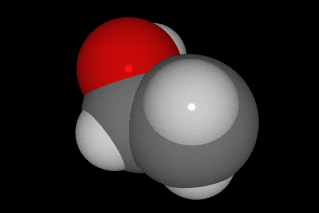
Friday’s Visualization Forum featured former Duke students David McMullen and Marcel Yang unveiling their innovative virtual-reality learning tool for teaching how alcohol is absorbed by the body. The project is an independent study with Duke professors Rochelle Schwartz-Bloom and Rachael Brady. Aimed toward college students, the program utilizes Duke’s Immersive Virtual Environment (DiVE) to give an acute spatial understanding of the chemical processes that take place.
Calm, voice-of-God narration describes the different stages of alcohol absorption and the enzyme mechanisms involved. The program also discusses genetic variation and differing levels of susceptibility to alcoholism.
 To get students engaged, the program has a fair amount of interactivity built in. Students observe chemical reactions and then are given the chance to recreate them, using a wand to direct placement of molecules and enzymes. The narration guides student’s actions, gently instructing them when they don’t fit the pieces together correctly.
To get students engaged, the program has a fair amount of interactivity built in. Students observe chemical reactions and then are given the chance to recreate them, using a wand to direct placement of molecules and enzymes. The narration guides student’s actions, gently instructing them when they don’t fit the pieces together correctly.There are many benefits to learning in such a hands-on environment. However, McMullen and Yang admit that many distractions are present as well, especially for users who have never experienced DiVE before.
“You’ll get people’s attention when they’re in there -- but focused on what?” McMullen said.
Schwartz-Bloom said she noticed some students gazing all around the room during the demonstration, and not paying attention to instruction. Certainly, this is a challenge the researchers hope to overcome.
As part of their research, McMullen and Yang had to evaluate the relative success of their program compared to other learning methods (PC version of the program or a paper handout). They found that DiVE had an advantage in some areas. However, they also discovered some flaws in the design of the experiment and are in the process of correcting them.
In the future, they plan to establish more valid achievement assessments and to test whether DiVE aids in long term retention of details and concepts. The team is working hard to prepare for the Visualization Challenge, May 1.
A computer-based version of the program was created to make it more widely accessible. The software will be available on the internet soon for public use.


No comments:
Post a Comment